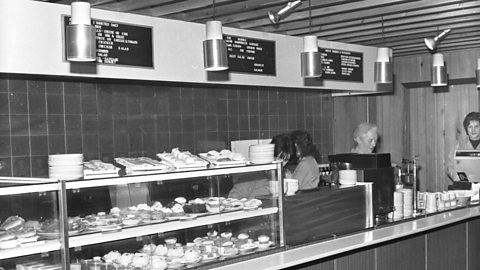Stanza two
As the speaker helps the blind man towards the stairs MorganÔÇÖs use of repetition and word choice serve to emphasise their slow progress. The repetition of ÔÇ£inchÔÇØ reinforces the small, tentative steps the pair take and reveals their careful, cautious movements.
The speaker, having agreed to help, is governed by the needs of the man. The choice of the verb drift
, coupled with this repetition, strengthens this idea. If something drifts it floats, moving gradually. Here we see how patient the speaker is and how dependent the blind man must be to rely so heavily and so frequently on the understanding and patience of others.
The use of a list helps to highlight the sounds and hazards the pair face on their journey. The physical dangers become obvious (the wet patches on the floor, the edges of the tables, peopleÔÇÖs feet) and we understand that, ironically, the speaker must become more aware of his surroundings, identifying the unseen dangers the man will encounter. His senses must be heightened in order to compensate for the difficulties of his charge.

The different sounds and smells described help to punctuate their journey and we get an impression of the blind manÔÇÖs experience as the speaker guides him to the stairs - he is reliant on touch, smell and hearing to provide a picture of his surroundings. Though these lines describe a few steps, the vivid detail (the range of sensations and observations detailed in the list) emphasises the agonisingly slow progress of the pair.
MorganÔÇÖs use of verbs during their journey down the stairs reveals the caution of the blind man and the support offered by the speaker. The word clings
tells us how tightly the man holds onto the speaker, all too aware of the danger that the stairs present to him. We are told how the blind man uses his stick, probing
the next steps and this also shows his careful nature as he methodically checks for obstacles.
The speaker aids the man, telling us how I guide his arms
. Once again, the verb helps us to understand the situation and the patience of both men as the speaker allows the man the time he needs, helping him as required.
The repetition of And slowly we go down
emphasises the time the journey takes and underlines the careful, gradual progress of the blind man and the speaker. This helps us to see their deliberate steps and the steady, measured pace. What this shows us is that the blind manÔÇÖs life necessitates patience and caution. A flight of stairs becomes a perilous obstacle and, left alone, the man is helpless.
As they finally reach their destination, MorganÔÇÖs word choice draws a contrast between the old man and the toilet. We are told that the man looks uncouth
in the clinical
toilet. Uncouth suggests that he looks coarse and out of place against the stark, sterile surroundings. This reminds us of the unflattering description of the man earlier in the poem.
As the man relieves himself, Morgan turns the trickle of his water
into a metaphor which is testament to the old manÔÇÖs embarrassing, helpless predicament. The comparison to an apology
suggests a feeble, lifeless quality to the man. Choosing to use this metaphor indicates a degree of sympathy for the old man - not pity, necessarily, but recognition and empathy that such a fundamental, straightforward task should present such a struggle.
The use of the simple, stuttering question Can IÔÇô wash my hands?
once again reminds us that the man depends upon the good nature and patience of others. The dash, used again suggests a tentative quality to the manÔÇÖs words and shows that he is uncertain of a positive response. The manÔÇÖs frailty is a lasting image in this section.
The adverbs feebly
and patiently
help us to see how slowly and deliberately the man moves as he washes his hands. The word choice suggests a lack of strength and vitality in his actions. The adverb gently
also suggests care and patience, this time from the speaker who moves the manÔÇÖs hands towards the dryer. We are aware of a growing connection between the speaker and the man as he helps in this simple yet intimate act of hand washing.
Repetition is used once again in the closing lines of the central stanza. Here, as earlier in the poem, it emphasises the slow movements of the pair. The repetition of "He climbs"
and And slowly we go up
underlines the gradual progress they make as they return to the main part of the caf├®.
By using repetition, Morgan reinforces the arduousness and effort involved in carrying out the simplest of tasks and we are able to glimpse for a moment the difficulty of this manÔÇÖs existence.
Morgan reveals his growing admiration for the man when he describes how he moves with that one/persisting patience of the undefeated/which is the nature of man
. What the speaker recognises is that, thought the blind manÔÇÖs progress is painfully slow, it is progress. He is testament to the determination of humanity, which is all the more impressive when we consider the extent of his physical limitations.
Finally, the man leaves the snack bar out of the speakerÔÇÖs life, and boards a bus. MorganÔÇÖs word choice once again reminds us of the manÔÇÖs unsteady movements. The bus shudders
as it moves and this motion mimics those of the blind man.